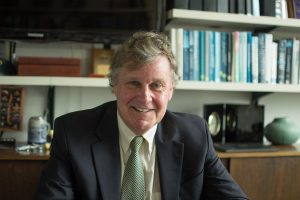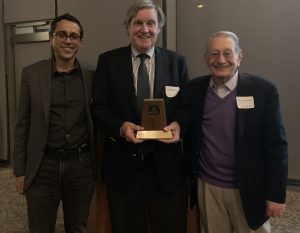
Prof. Clifford P. Kubiak
Clifford P. Kubiak is Distinguished Professor and the Harold C. Urey Chair in Chemistry at UC San Diego. He was born in Stamford, CT, and studied at Brown University (Sc. B. in chemistry), and the University of Rochester (Ph. D. in chemistry) with Rich Eisenberg. After a postdoctoral appointment at MIT (1980-1981) with Mark Wrighton, he joined the faculty of Purdue University where he served (1982-1998) until moving to UCSD, where he has spent the last twenty years. His research spans the fields of inorganic chemistry, physical chemistry, and nanomaterials. His research group has been investigating the chemistry, electrochemistry, and photochemistry of carbon dioxide since 1987. The catalytic reduction of carbon dioxide is a topic of considerable current interest in the field of artificial photosynthesis, where researchers seek to develop light harvesting materials and catalysts for the chemical conversion of carbon dioxide, water, and sunlight to liquid fuels. Kubiak has been a Principal Investigator of the Joint Center for Artificial Photosynthesis (JCAP) since its inception in 2010. Kubiak also has a long standing interest in inorganic mixed valency, especially systems where rates of intramolecular transfer occur on the picosecond time scale and give rise to coalescence of infrared spectra in a manner reminiscent of dynamic NMR, but on a time scale that is a billion times faster. Kubiak was one of the first inorganic chemists to work in the area of molecular electronics. He was a member of a research team that made the first direct measurements of the electrical resistance of individual molecules by scanning probe methods. He has published over 270 articles on these and other subjects. He supervised the research of 80 Ph.D. graduate students and postdoctoral researchers. His honors include the American Chemical Society Award in Organometallic Chemistry (2018), the American Chemical Society Award in Inorganic Chemistry (2012), the Fred Basolo Medal for Outstanding Research in Inorganic Chemistry (2015), Inter-American Photochemical Society Award in Photochemistry (2013). He was elected Fellow of the American Academy of Arts and Sciences (2014).
Richard C. Tolman Award Dinner
Honoring
Professor Clifford Kubiak
University of California, San Diego
Monday, May 20, 2019
7:00—hosted cocktail hour
8:00—Dinner
8:30—Presentation
University of California San Diego
Ida and Cecil Green Faculty Club
Atkinson Pavilion
9500 Gilman Drive
La Jolla, CA 92093
Tolman Address: “If you make a fuel from air, water, and sunlight, what should it be?”
Abstract: Catalysts for the reduction of CO2 are of interest in the production of solar fuels, and as a means of mitigating atmospheric CO2. The question of which solar fuels should be made from CO2 is an important one. Unlike water splitting (H2O -> H2 + ½ O2) where a single reduced product (H2) is obtained, the reduction of CO2 can produce a variety of different chemical reduction products, CO, HCOOH, H2CO, CH3OH, CH4, to name a few, as well as C2 and higher products. Which product(s) will be produced from solar energy, and then be used as building blocks to manufacture higher fuels and specialty chemicals is not presently known. Indeed, the question of whether CO2 should be reduced electrochemically to an organic molecule, or instead, hydrogen produced by water splitting should be used to hydrogenate CO2 to organic products, is not clearly understood at this time. There are very few known catalysts for the efficient hydrogenation of CO2, so whether electrochemical reduction or hydrogenation of CO2 is ultimately practiced on an industrial scale, the development of new catalysts will be required to enable new technology. Results from several recent approaches to producing higher value solar fuels from CO2 including synthetic biology and tandem catalysis are presently under investigation. Several recent accomplishments in the activation and electrochemical reduction of CO2 have been achieved. These include the use of earth-abundant metals including manganese, in place of rhenium and ruthenium, and the use of artificial co-factors to promote catalysis. Other recent approaches to developing catalysts for the reduction of CO2 include the deployment of proton relays in associated ligands to manage proton transport, introduction of new systems in which proton coupled electron transfer for efficient H-atom transfers can be effected, supramolecular catalyst assemblies that use non-covalent interactions to direct catalyst centers toward substrate activation, and artificial metalloprotein electrocatalysts. The general properties of molecular catalysts on conducting substrates under bias as probed by surface spectroscopies pose challenges to researchers attempting to do catalysis at an electrified interface. Surface spectroscopies can provide detailed information about the electronic structure and environmental effects of catalysts operating within the diffusion layer of an electrode under bias. Recent results of achieving highly active hybrid electrocatalyst materials based on molecular catalysts and graphitic carbon supports for selective reduction of CO2 in water at neutral pH will be highlighted.
Dinner: There will be a Mediterranean Buffet including Greek Salad, Vegan Bulgur Wheat Salad , Citrus Baked Salmon with Lemon Caper Herb Sauce, Chicken Tapenade with a Olive Tomato Caper Relish, Roasted Seasonal Vegetables and Rosemary Roasted Potatoes.
Cost: $65 per person including cocktail hour, buffet, wine or beer with dinner and tax and tip.
RSVP: There is an EventBrite link set up to make reservations and pay: https://www.eventbrite.com/e/the-scalacs-richard-c-tolman-award-dinner-meeting-tickets-60283359150. Please RSVP by Friday, May 10th.
Directions: Please see the UCSD website for directions and parking information at https://facclub.ucsd.edu/directions/index.html.
Richard C. Tolman Dinner
May 20, 2019


